 Petzlover
Petzlover Both Korat and Traditional Siamese are originated from Thailand. Both Korat and Traditional Siamese are having almost same weight. Korat may live 5 years less than Traditional Siamese. Both Korat and Traditional Siamese has same litter size. Korat requires Low Maintenance. But Traditional Siamese requires Moderate Maintenance
Both Korat and Traditional Siamese are originated from Thailand. Both Korat and Traditional Siamese are having almost same weight. Korat may live 5 years less than Traditional Siamese. Both Korat and Traditional Siamese has same litter size. Korat requires Low Maintenance. But Traditional Siamese requires Moderate Maintenance
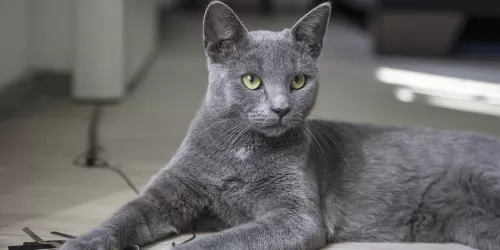 The Korat cat is a breed of domestic cat. He is a natural breed and originates from Phimai in Thailand.
The Korat cat is a breed of domestic cat. He is a natural breed and originates from Phimai in Thailand.
It is thought that the cat is named after its province of origin – Nakhon Ratchasima Province which is actually called Korat by the Thai people.
The cat is also known as the ‘Good Luck’ cat. The cats first appeared in Britain under the name Blue Siamese and later in the United States in the 1950s.
It was in 1959 that a cattery started with breeding and in 1966 the Korat was accepted into championship status.
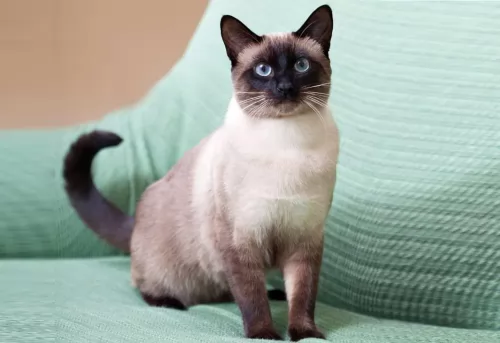 There are now three types of Siamese cats. The Traditional Siamese is said to be the original cat imported from Thailand.
There are now three types of Siamese cats. The Traditional Siamese is said to be the original cat imported from Thailand.
The Classic was the type that was common in the 50’s, 60’s and 70’s. The original Siamese cat became one of the most popular breeds in Europe and North America in the 19th century.
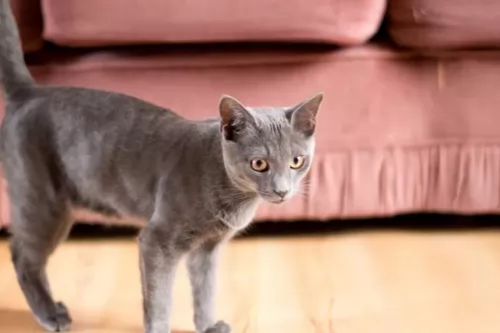 The Korat is a short-haired, single coated cat breed that has a small to medium build. He stands at about 25 – 30cm in height.
The Korat is a short-haired, single coated cat breed that has a small to medium build. He stands at about 25 – 30cm in height.
He weighs about 3 to 5kg. He is known for his large, beautiful green eyes. It’s a beautiful blue-grey cat with unusual coloring - a shimmering silver-tipped blue that the Thai people refer to as ‘rain-cloud grey’.
With his silver-tipped blue-grey coat and large green eyes, this is indeed a beautiful cat.
The Korat is a friendly cat and can get along well with children who have been taught to be kind to animals and to respect them.
They’re also cats that like to make friends with other pets in the family. They also enjoy the companionship of their human family. They’re intelligent cats too and you won’t have trouble teaching him a trick or two.
He doesn’t want to be left alone and if you work full-day, it would be best to get such a cat another cat companion. He isn’t a noisy cat but fairly quiet, enjoying a quiet environment.
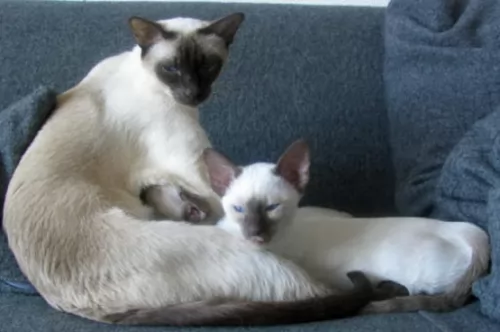 The Traditional Siamese cat is medium-sized, lean, and muscular and weighs between 3 and 6kg. The coat is short and he is considered a medium shedder.
The Traditional Siamese cat is medium-sized, lean, and muscular and weighs between 3 and 6kg. The coat is short and he is considered a medium shedder.
The kittens of these cats are born white and the coloring comes in over the next days and weeks. The head of the Traditional Siamese is well proportioned to its body size.
The medium size ears are slightly rounded at the tip and the eyes are large and bright blue in color.
The coat is short, sleek, and soft and accepted colors are cream with chocolate, brown, lilac, red, tortie or blue points.
The personality of the Traditional Siamese is loud, vocal, and demanding. These cats let you know precisely what they want and it is almost like having a human companion in the house.
They love to give their human owners lots of attention as well. They’re intelligent, curious, playful, and energetic.
The Traditional Siamese cat isn’t really recognized by the Cat Fanciers Association (CFA) anymore as the breed’s temperament has changed so much.
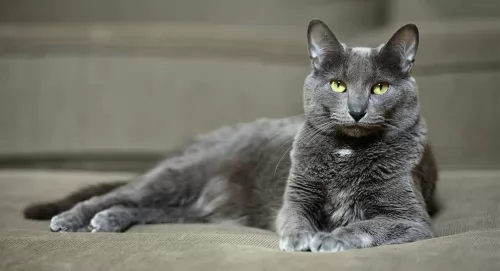 Think carefully before you take a cat into your life. If you are hardly ever at home, some cat breeds are very social, and this quiet, solitary lifestyle will be detrimental to their health.
Think carefully before you take a cat into your life. If you are hardly ever at home, some cat breeds are very social, and this quiet, solitary lifestyle will be detrimental to their health.
If you aren’t willing to learn what the nature of a cat is, your cat will be unhappy and you’ll spend a lot on vet’s fees as his immune system will be compromised.
It would be most unkind to take a Korat cat into your home and not understand something of its behavior. A cat such as the Korat thrives on plenty of love and attention.
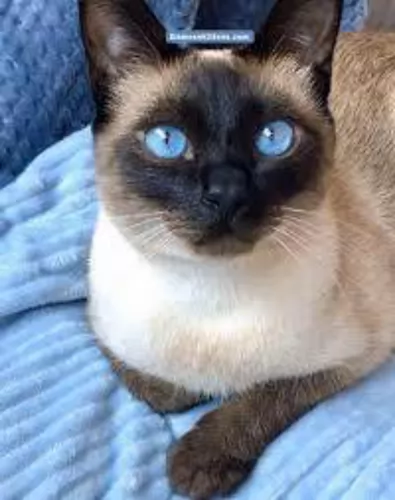 The Traditional Siamese cat is such an amazingly intelligent animal and sometimes they can become quite human.
The Traditional Siamese cat is such an amazingly intelligent animal and sometimes they can become quite human.
These are not your traditional cool, independent, sleep all day kind of felines and people liken them to having a dog as a pet. They love to play, and they are so active you could even put a leash on one and take it for a walk.
They are energetic, local, and lively. They are such affectionate cats too and they get on well with children and with other pets.
When you bring a Traditional Siamese cat into your life, it is like you are bringing in a human companion, except that the Traditional Siamese is far more amicable than many humans.
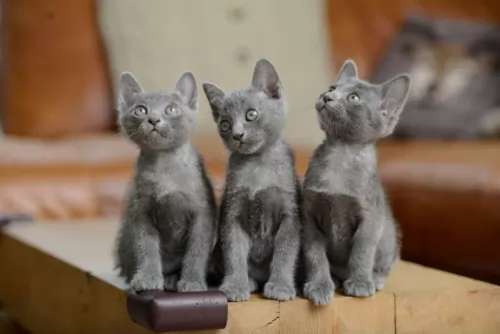 The Korat is generally healthy but even so, there are always one or two cat ailments that need to be sorted out.
The Korat is generally healthy but even so, there are always one or two cat ailments that need to be sorted out.
If your Korat cat succumbs to any one of the common cat illness there are, get veterinary help. These illnesses can be cancer, feline leukemia virus, diabetes and heartworm among others.
Feline Lower Urinary Tract Disease (FLUTD) can be found in male and female cats, often occurring in cats that are overweight or stressed.
Your cat will strain to urinate, may vomit, will have a lack of appetite, lick around the urinary area, and be most miserable. The problem is regarded as an emergency and you need to get your cat to the vet as soon as possible.
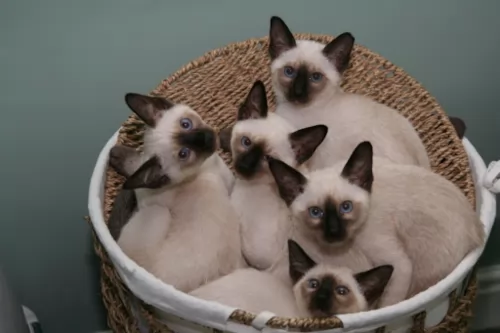 Avoid obesity. Siamese cats are prone to obesity and these slim cats can’t afford weight gain. Extra weight can put a whole lot of pressure on the cat’s joints and they can also develop other problems such as diabetes. The label of the commercial cat food you give your Traditional Siamese will indicate how much food your cat should get a day based on your cat’s weight.
Avoid obesity. Siamese cats are prone to obesity and these slim cats can’t afford weight gain. Extra weight can put a whole lot of pressure on the cat’s joints and they can also develop other problems such as diabetes. The label of the commercial cat food you give your Traditional Siamese will indicate how much food your cat should get a day based on your cat’s weight.
Diet plays a massive role in the health of a cat, and inferior cat foods can mean you spending more money at the vet because of digestive issues.
If you are in any kind of doubt as to what to feed your cat, rather speak to your vet about what and how much to feed him. Your cat is a carnivore and it is most important to feed your cat foods high in protein.
Take your cat to the vet whenever he is sick and also just for a general check-up. You want to make sure that your Traditional Siamese is free from any health problems as well as parasites.
Also, make sure your cat is always up to date with his vaccinations as there are some cat illnesses such as feline panleukopenia, also known as distemper, that can kill your cat.
It is always a good idea as well to spay or neuter your Siamese to prevent unwanted pregnancies.
If your Traditional Siamese has any health conditions, your vet can help provide you and your pet with a treatment program.
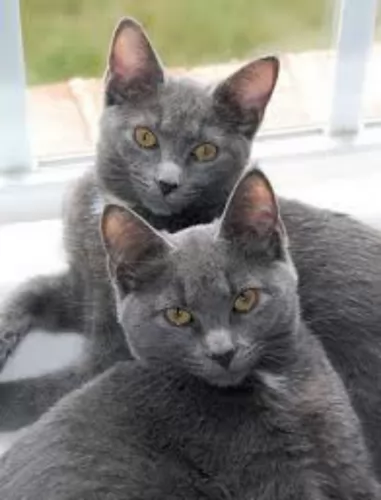 The Korat’s short single coat requires little grooming. You can brush it once a week to remove shed hairs.
The Korat’s short single coat requires little grooming. You can brush it once a week to remove shed hairs.
Trim the nails when they become too long.
Check your cat's eyes and make sure they’re still bright and clear.
Check the ears when you brush your cat and look out for signs of redness which could indicate an infection. Pet groomers or your vet can show you how to groom your cat or you can take your pet to the pet groomers.
Provide your cat with a litter box and keep it spotlessly clean. Remove the feces every single day. The litter will also need to be changed periodically.
Have your cat neutered or spayed.
Vaccinate against the major cat illness.
A good diet is essential for good health, and in fact, a cat’s food needs to be adapted to the different seasons of a cat’s life.
Cats are carnivores and they require nutrients from animal products. They need a mix of vitamins, fatty acids, minerals, and amino acids.
There are excellent commercial cat foods on the market, whether it be dry food, semi-moist food or wet food. These foods have been made to give your cat the right balance of nutrients.
In choosing cat food, it is important to consider your pet’s age and energy levels and it is also important to read the ingredients list. Look for foods in which meat is at the top of the ingredients list.
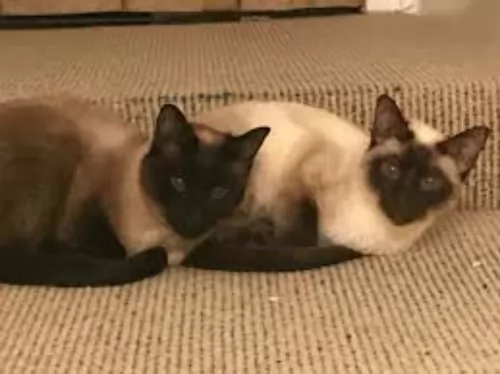 To care for your Traditional Siamese, you need to feed him a high protein diet. Always read the labels of the cat food you buy to ensure that the proteins included come from animal sources and not from plants.
To care for your Traditional Siamese, you need to feed him a high protein diet. Always read the labels of the cat food you buy to ensure that the proteins included come from animal sources and not from plants.
Brush your Traditional Siamese cat regularly. He has a short coat so once a week will be enough to keep it shiny and clean.
You can feed your cat and provide all he needs, but nothing will be more important to your cat than showing your love for him by spending lots of time with him and showering him with love.